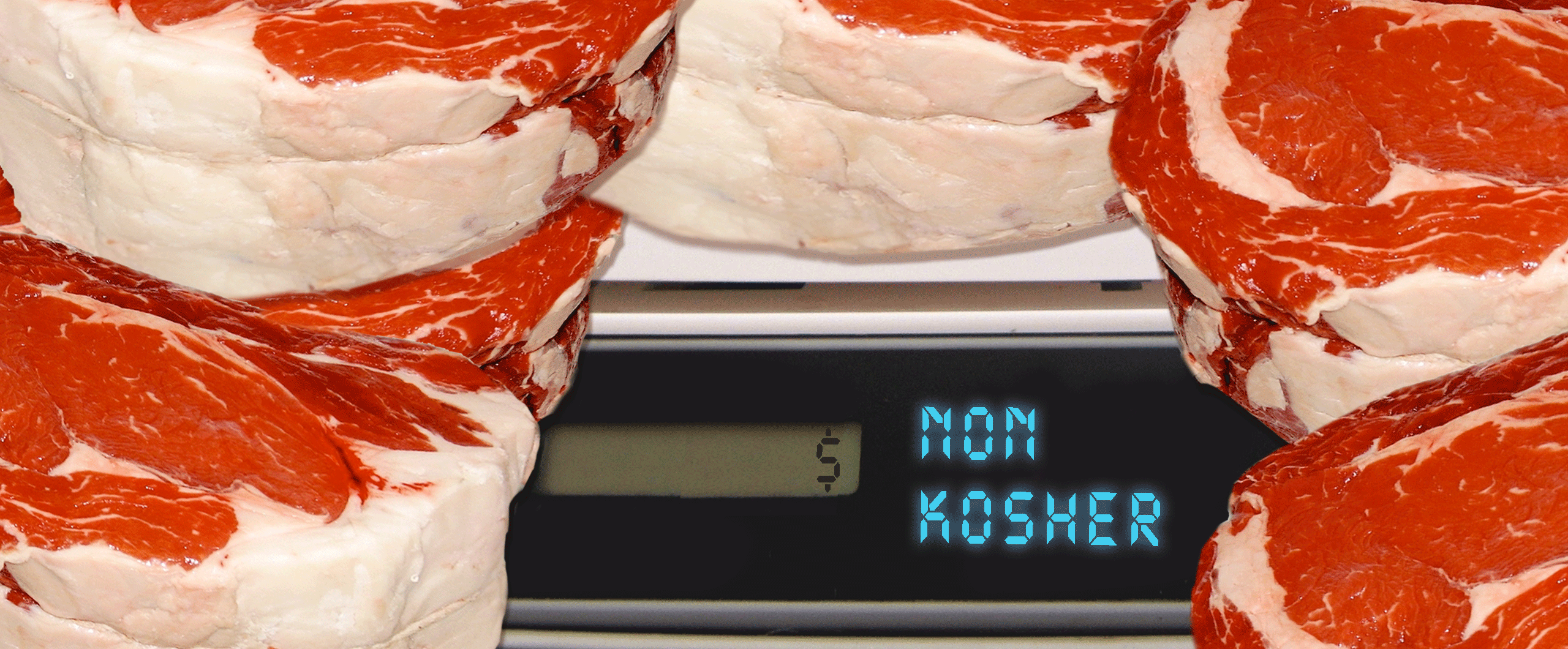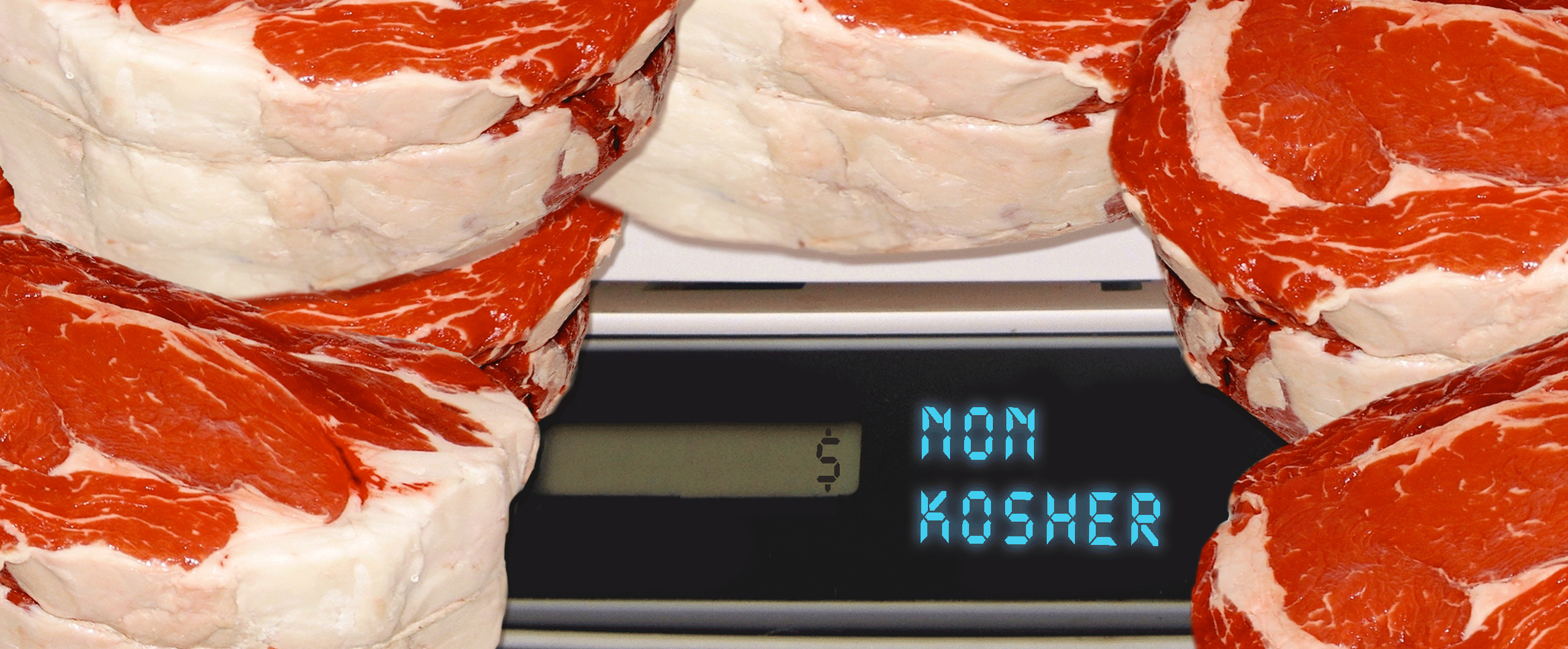What’s Your Beef?
A new lawsuit challenges Israeli rules for kosher meat, calling them a corrupt windfall for the Orthodox rabbinate




Sitting in his spacious office in the town of Kfar Kanna, near Nazareth in the Galilee, Ahmad Effendi Meat Co. CEO Eiad Awawdy calmly described his 2014 encounter with Israel’s Ashkenazi chief rabbi, David Baruch Lau.
“I started to ask him interesting questions,” Awawdy, 43, said, of the meeting at a Chamber of Commerce event in Tel Aviv. “‘Is Judaism a missionary religion?’ He said no. I asked him: ‘Is Judaism a religion of coercion?’ He also said no. So I said: ‘Then how is it possible that you, the religion of Moses, are coercing us and interfering with our food? Why do you want me to eat my meat according to your halacha?’”
(The chief rabbi’s office stated that he does not remember the incident.)
On May 18, Awawdy and a dozen other Arab-Israelis, represented by Adalah, the Legal Center for the Arab Minority Rights in Israel, demanded an answer from Israel’s supreme court. Their petition seeks to overturn or allow exceptions to the 2004 law requiring all imported meat to be certified as kosher according to the strict standards of the Israeli chief rabbinate. The import ban, combined with economic factors, effectively forces Muslim and Christian Israelis to buy kosher meat even though they have no obligation to follow Jewish dietary law. “We have no problem with Judaism or with the State of Israel,” Awawdy said, “but we feel free to oppose religious coercion.”
The court will hear the petition in February. According to legal experts, the case has a good chance of success. “I don’t see how the court will deny the petition,” said Shuki Friedman, director of the Center for Religion, Nation, and State at the Israeli Democracy Institute.
Israel’s Arab minority makes up 20 percent of the country’s population. In recent years, Arab citizens have had to contend with a raft of discriminatory legislation and overt hostility in the media and from leading politicians; newly installed Defense Minister Avigdor Lieberman, for instance, has infamously referred to Arab-Israeli politicians as “traitors” and a “fifth column.”
But they have also been left behind economically. The Arab-Israeli population is plagued by high unemployment and high poverty rates; women are especially hard-hit. Despite recent government investment in infrastructure, job growth, and education in Arab communities, the OECD reports that Arabs continue to lag behind the Jewish majority.
These economic factors play a crucial role in creating the situation the petition aims to redress. As Sawsan Zaher, the Adalah lawyer who filed the petition, explained, there are no prohibitions on slaughtering or selling fresh non-kosher beef, lamb, or poultry in Israel. But the law does require that all beef imported into the country be kosher. As the price of local meat began increasing in the mid-2000s, a result of rising meat prices globally and increases in the cost of living in Israel overall—an issue that has remained on the political agenda since the widespread 2011 economic protests—imported kosher beef became more and more attractive for the average Arab consumer.
Kosher meat is permissible for Muslims, and Christians have no such ritual dietary restrictions.
Even with the extra cost of kosher certification, imported frozen meat is significantly less expensive than both kosher and non-kosher beef produced locally. According to Awawdy, locally produced kosher beef costs about 60 NIS a kilo and non-kosher beef 55 NIS a kilo, while imported, frozen beef is 24 NIS a kilo, less than half the price. So imports now make up some 70 percent of the Israeli meat market overall, he said.
The meat law adversely affects Arab consumers in a number of ways. Because of kosher restrictions, certain cuts of meat that are permissible for Muslims and Christians are not imported to Israel at all. The kashering process, especially the salting of the meat to remove the blood, also changes the taste of the final product. The petition quotes several consumers who refuse to purchase kosher meat and pay the higher price for the local product because of these changes in flavor and texture.
The economic impact is just as important, both for consumers and for potential importers like Awawdy. The chief rabbinate has a monopoly over kosher supervision in Israel and also dictates the prices and standards for kosher certification in meat production facilities in Argentina, Poland, and elsewhere. The cost of adhering to the rabbinate’s kosher requirements—including hiring a team of rabbinate-approved Israeli supervisors to send abroad—is 424,000 NIS ($124,000) a month, in addition to a 4.5 million NIS ($1.158 million) initial investment in infrastructure for the slaughterhouse. However, Awawdy explained, because his company sells only in the Arab market, he is unable to import in large enough volume to make these investments worthwhile.
Ultimately, the cost of this kosher certification falls on the Arab consumer. Because Arab-Israelis, on the whole, consume more meat and are less well off than Jewish Israelis, the kosher premium—which, according to Awawdy, adds nearly 20 percent to the price of a kilo of imported meat—is an extra burden they can ill afford.
“In my eyes, the whole issue is economic, and not religious at all,” said Omer Moav, a professor of economics at the University of Warwick and at the Interdisciplinary Center in Herzliya. “It’s all a matter of the economic power of the religious establishment in Israel. The fact that they have a monopoly is an opening for all kinds of corruption, but the monopoly creates costs for the entire economy, for Arabs and Jews.”
According to a 2015 Ministry of Finance report, the cost of the chief rabbinate’s kosher monopoly to the Israeli economy is 600 million NIS ($154 million) a year. Rabbi Rafael Frank, the spokesman for Chief Rabbi Lau, said the rabbinate is “considering and studying the supreme court petition.”
***
But this story is ultimately about more than the price of steaks and chops. The challenge to the meat law touches on two basic unresolved conflicts in Israeli society: the relationships between religion and the state and between the Jewish majority and the Arab minority.
While the State of Israel still lacks a formal constitution, in the early 1990s the Knesset passed legislation meant to enshrine elements of a bill of rights in Israeli law. In March 1992, the Knesset adopted two Basic Laws protecting fundamental freedoms. One was Basic Law: Human Dignity and Liberty, which protects the rights to “life, body and dignity,” property, and privacy; another was Basic Law: Freedom of Occupation, which grants every Israeli citizen or resident the right to “engage in any occupation, profession or trade.”
The adoption of these Basic Laws was heralded by then supreme court Chief Justice Aharon Barak as a “constitutional revolution.” However, Jewish religious parties and their constituencies feared that the enactment of these Basic Laws would overturn the status quo between religion and the state—a political compromise that sets aside certain areas for religious control, such as the chief rabbinate’s monopoly over kosher certification—that had prevailed in Israel since the country’s founding.
A court case decided almost immediately after the adoption of the Basic Laws seemed to confirm these fears. In 1992, the government privatized the meat-importing industry, but, as a concession to Jewish religious sentiment, forbade the import of non-kosher meat. Meatrael, a Jewish-owned company, petitioned the supreme court to overturn this ban, claiming that it violated the company’s rights under the Basic Law: Freedom of Occupation. The court accepted the argument in a 1993 decision.
Were it not for other political considerations, this might have been the end of the story. But Prime Minister Yitzhak Rabin’s government was in need of support for the Oslo Peace Accords. When the Orthodox Shas party, a member of the coalition, threatened to bring down the government over the kosher issue, Rabin acquiesced to its demands. At the government’s insistence, the Knesset amended the Basic Law, leaving a loophole bypassing its strict protections, and then, just minutes later, passed the Importation of the Frozen Meat Law (1994), which prohibits the import of meat not certified as kosher. Though Meatrael, the same company that had won the earlier court case, challenged this new law as well, the supreme court rejected this petition.
“They were willing to sell out religious freedom for the baseless hope that the Haredi parties would practice a quid pro quo on peace,” said Uri Regev, founder of Hiddush, an organization working to promote freedom of religion and equality in Israel, of the secular parties.
However, Regev said, there was a good chance Adalah’s petition would succeed this time. The petition argues that the kosher requirements of the law, which are enacted without taking into account the special situation of Israel’s non-Jewish Arab minority, are tantamount to religious coercion and violate Arab citizens’ rights to dignity, nondiscrimination, and religious freedom that are enshrined in Basic Law: Human Liberty and Dignity.
“We are dealing with 20 percent of the population that is sidestepped in enacting legislation that serves the interests of a religious group of the majority population,” Regev said. “You can’t deprive hundreds of thousands of citizens of their rights in order to appease the rabbinate.”
He added that the petition is especially strong because it argues that rather than overturning the law the government could grant exceptions for importers that serve the Arab market. Similar workarounds are already on the books: an exception allows the raising of pigs in Christian-majority communities even though pig farming is generally illegal under Israeli law.
When the first report about Adalah’s petition appeared in Haaretz, secular Jews responded online by saying that they, too, were tired of paying for the ban on kosher meat. “The obligation to import kosher meat is not only religious coercion for Arabs, but for all of us!! The kosher requirements significantly raise the price of the meat, and I doubt whether the dosim are very strict when it comes to quality and cleanliness,” one reader wrote, using a derogatory term for Orthodox Jews. “We all know how they eat themselves.”
“The truth is that there is only a slight difference on this issue between Jews and non-Jews,” explained Shuki Friedman. “If a Jewish businessman wants to bring meat from abroad, it’s his right to have freedom from religion, just like an Arab businessman. When you’re talking about Arabs, though, the claim is even stronger because the rabbinate can’t argue that they need to eat kosher.”
***
Like this article? Sign up for our Daily Digest to get Tablet Magazine’s new content in your inbox each morning.
Samuel Thrope is a Jerusalem-based writer and the translator of Jalal Al-e Ahmad’s The Israeli Republic.